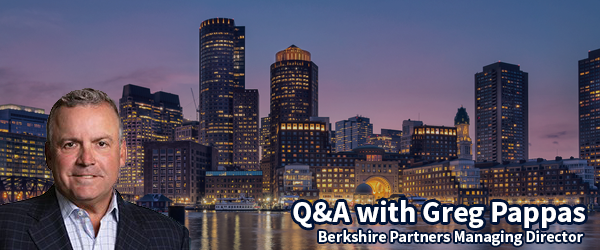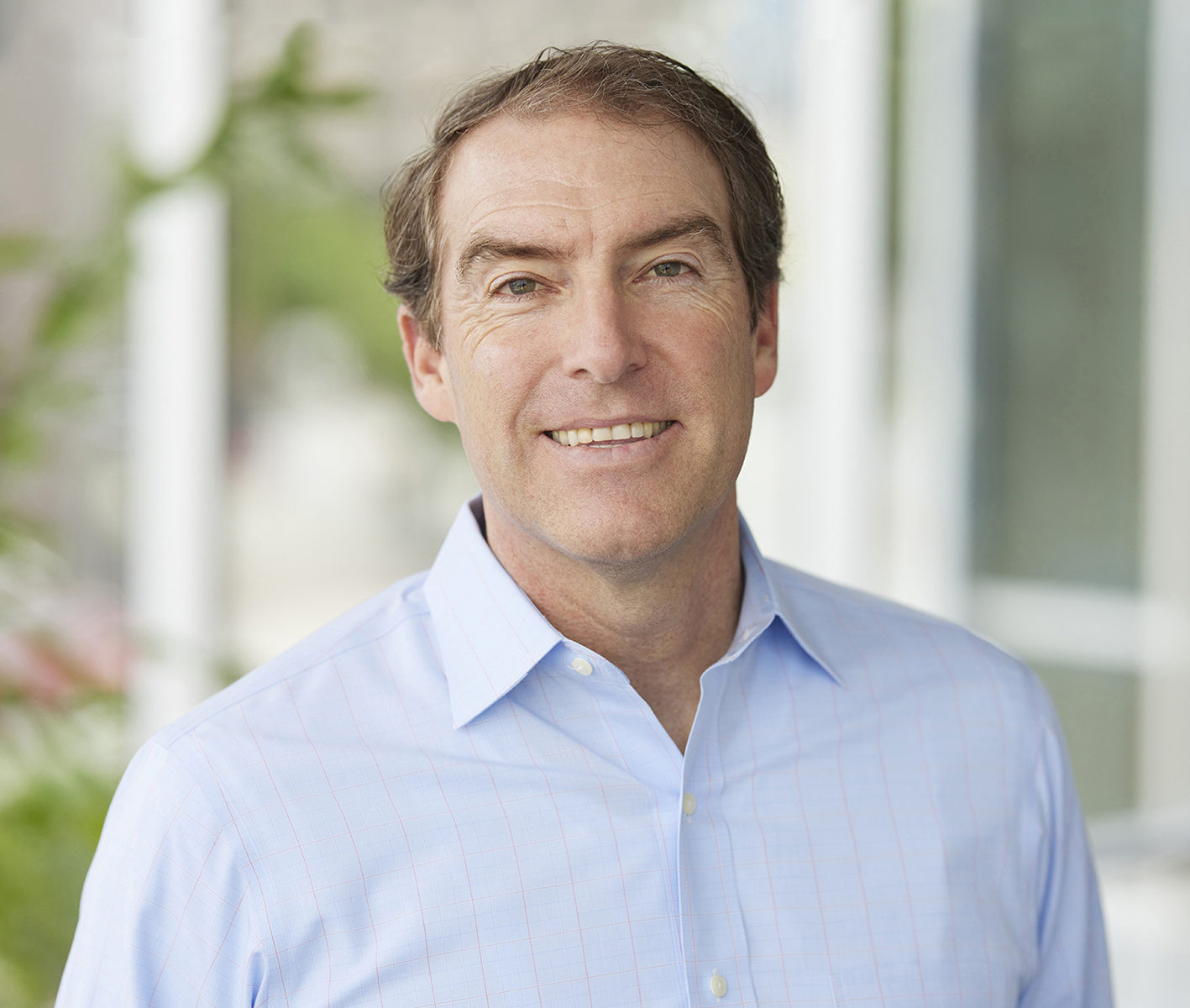In the Spotlight with Greg Pappas, Managing Director at Berkshire Partners

Charles Aris CEO Chad Oakley and Vice President Ashlee Wagner sit down with Greg Pappas, a managing director and head of the portfolio support group at Berkshire Partners.
Greg Pappas is a managing director and head of the portfolio support group at Berkshire Partners, where he has served for the previous nine years. Prior to Berkshire, Greg was a senior partner for 12 years at The Parthenon Group, where he managed the firm’s private equity practice and served as a member of its executive committee. Earlier in his career, Greg was with Deloitte’s audit and financial services group, where he advised on mergers and acquisitions as well as the organization of control, cost management and reporting systems. He attended Lehigh University and has an MBA degree from Harvard Business School.
Berkshire Partners is a leading private investment firm with a track record of success spanning more than 30 years. Berkshire has raised nine private equity funds with more than $16 billion in aggregate capital commitments and manages a marketable securities fund, Stockbridge Investors, with more than $3 billion of capital.
What are the top three responsibilities occupying your time as a managing director at Berkshire Partners?
I have two roles at Berkshire: One is as the leader of the firm’s portfolio support group and the second is as a member of the group itself, working directly with select portfolio companies.
1. I work with the entire investment staff to articulate and develop our philosophy of portfolio support. This includes bringing the entire investment staff together to establish consensus on our philosophy, approach and resources necessary to support our investments to make sure that each achieves its potential. From that formulation, I’m accountable for developing and expanding our internal and external network of resources to meet the increasing demands of portfolio support. This includes recruiting, hiring, mentoring, onboarding and developing key members of our portfolio support team.
2. I am the lead portfolio support team member for certain portfolio companies, and in that capacity I do three things: 1) ensure that we have alignment on all initiatives, investments and decisions to deliver on the intended investment thesis; 2) work with the board and management team to make sure we have the right leaders in the right seats; and 3) play a role in steering committee leadership, bringing both inside and outside resources to help the company execute on the value creation plan, which is driven by our investment thesis.
For people who are interested in a similar career path to yours, which skills and competencies are most important for success?
First and foremost, people need to have strategic agility – the ability to take different situations and apply a new set of thinking, analysis, research and perspectives that are customized for each situation. There isn’t a singular approach to achieving this purpose. There are multiple ways to solve every problem, and every company has different drivers. The ability to have that strategic agility to flex within or across different industry segments is important. You can’t be the person that comes with one playbook where it’s “repeat, repeat, repeat.” You must possess intellectual curiosity, and you can’t be too quick or too slow with an answer.
Second is the ability to influence others. This is why we have found former consultants to be successful in this type of role. You need to demonstrate that you can answer important questions but also bring the organization along with you. You must be able to influence CEOs and senior executives, knowing they have a strong track record of success that got them to where they are today. Bringing them along with you to pivot at the right time is critical. If you can’t do that, then all your hard work is for nothing.
Third, you must be very network-oriented. You are one person on a big team of people. To make a change in a company’s trajectory, you need to bring something new or different to the situation. It’s not what you alone can accomplish but how you can bring others into the equation to help you. The harder those resources are to get, the more value you can bring.
Fourth is the need for humility in this job. To be successful in private equity as a firm, you make great investments, move the company forward and sell at the right time. It’s a team sport, and you can’t have the “hero” mentality. Other people may have a better idea than you, and you need to accept that without any hesitation and incorporate their ideas seamlessly.
Lastly, it’s important that we’re pragmatic in this job. It’s the delivery of value, and we value people who have done consulting and have operations experience. If you have a difficult time making quick decisions, even though there’s always more analysis that can be done, then this role could be a challenge for you.
What’s the best career development advice that you’ve ever received?
Apply yourself fully and completely to whatever you are working on or you won’t get enough out of it. Making the most of every situation you are in will build a better track record and result in a better career. You want to always be committed, always “be on” and 100%, no matter the headwinds against you. People who are fully committed 100% of the time have the best careers.
Also, the reason why a network is so important is that you never know who will matter in your life and who can make an impact on a situation in the future. So don’t try to choose who you help – everyone will matter over the course of a long career. Engage with each person as if they fully matter because odds are that they will come back around one day. Helping others can be the most fulfilling part of any career on so many levels.
What is the most impactful event that has driven success in your career?
It was probably joining Parthenon when the private equity industry was in formation. When I was at Parthenon, the private equity industry was emerging in a unique way that involved a greater focus on operational success, and at the firm we poured our energies into this emerging need. It gave me an opportunity to be at the forefront and creation of what is today a very compelling industry. This accelerated my career.
What do you miss the most from your time in consulting?
Truthfully, there is a surprisingly low amount of stress in consulting that you don’t realize until you do something outside of consulting. All you can do in consulting is do your best to deliver great work product to clients, with all the passion that you can bring. But ultimately, the client owns the success or failure of your advice, so you don’t feel the same stress that they do. You can sleep well at night after you have done a great job, whether or not your client implements the advice you’ve given them. It’s a terrific aspect, but at the same time it might leave you feeling a little empty if you don’t own the end result as well.
Similarly, in consulting you get immediate feedback on your efforts, as opposed to in investing or operating leadership where you typically have a three-to-five year-run tail on any key decision you decide to implement. There can be a lot of rocky road along the way that consulting doesn’t deal with directly.
Anything else you’d like to share?
I am often asked about the biggest challenge people face when moving into this type of job. It gets back to the influencing concept that we discussed earlier. There are times in this job whereby grabbing the wheel away from management may generate a positive outcome in the short term – and may seem like the easiest route at that time but won’t make the company better in the long term. You need to influence people in the organization to make the right decisions on their own. That way, they will own it throughout the life cycle. Decisiveness is great but there’s a balance that you practice. This is about teaching the village to fish rather than just feeding the village fish.
How do you keep yourself sane in a 24-hour work world?
I spend a lot of time thinking about what I need to do over time as opposed to just “in the moment.” This allows me to get away, play golf, spend time with family and friends. The person who can be “in” for six great hours is so much better than the person who is 60% but 24/7. Force yourself to take time with family and friends and engage with them, knowing that the never-ending pile of work is always going to be there. For example, I’ve been working a lot on the West Coast and instead of coming back to Boston for Valentine’s Day with my wife, she came along and we spent a long weekend in Hawaii. Taking advantage of work opportunities for personal enjoyment is important. We even played golf on a volcano as well, which was a special experience.
What’s the one app you can’t live without?
I’m a crazy crowd-sourcer in everything I do, so for example I have multiple apps (Yelp, among others) that help me find new restaurants to try. Every time I go somewhere, whether for business or personal, I go to a new restaurant rather than the same old places. Using people’s collective experiences to choose how to take chances, I do that 100% of the time rather than repeating the same thing over and over.
SIMILAR ARTICLES
Meaningful conversations: How our deal-sourcing team connects with founders
We launched our transaction services business with the guiding philosophy that meaningful conversations lead to successful deals.
The new era of workplace wellness at Charles Aris
Throughout the past year, we’ve also integrated firmwide activities into our culture to promote healthy meditation, social events and exercise.
Charles Aris in the community
Our firm places a high value on giving back to our communities, and our team members have been working alongside several organizations to do so.



